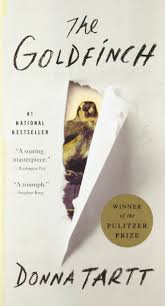Delightful, De-lovely, and Debatable
If one of the key skills of being a good book editor is knowing what would sell and what would not, I’m glad that my career is elsewhere. It’s often a surprise to me.
 Take Donna Tartt’s The Goldfinch. It’s a Pulitzer Prize winning novel that is being made into a movie. When it was published a few years back, it seemed that everyone was reading it (at least when they weren’t watching Game of Thrones) or talking about it. It’s a hefty work and folks likened it to Dickens. I then read that a few critics thought it wasn’t that great after all – while others said to read it anyway. The debate seemed to be about the quality of Tartt’s prose, the complicated plot, and its relative accessibility.
Take Donna Tartt’s The Goldfinch. It’s a Pulitzer Prize winning novel that is being made into a movie. When it was published a few years back, it seemed that everyone was reading it (at least when they weren’t watching Game of Thrones) or talking about it. It’s a hefty work and folks likened it to Dickens. I then read that a few critics thought it wasn’t that great after all – while others said to read it anyway. The debate seemed to be about the quality of Tartt’s prose, the complicated plot, and its relative accessibility.
The book’s opening, a lengthy first-person narrative account of love, loss, a bombing, and a theft is tightly written. It’s engaging, memorable and really impressive. The remaining 750 pages? I found it to be much less effective. In fact, it seemed to lose direction and several times I lost interest. It surprised me that so much attention has been given to this novel. It is a solid work, but really? It is not an amazing novel and it is most definitely not the kind of literature that college students will be writing about in ten years. At least that’s my take. It took some reflection and study, though, to figure out why I was disappointed.
I am fine with complicated plots, accessible prose, and the occasional awkward sentence. There can be more than a few clunkers in the prose, too. A novel doesn’t have to be highfalutin or philosophical or even aspirational for me to give it praise. I am a tolerant reader, ready to give the author many breaks. My interest in a novel tends to be hooked to a character, a plot, a question, or, if the writer is really good, a viewpoint or perspective. What frustrates me is an absence of authorial integrity or consistency.
We don’t need to review the plot of The Goldfinch, which is easy enough to find. It is a coming of age story. Through much of the latter part of the book our narrator – a teen and then a young man – leads a self-destructive lifestyle, consuming massive amounts of alcohol and drugs. He is an addict, a deeply troubled and wounded character. Yet this behavior has no effect on his narrative voice, the lucidity of his prose, or even his actions. This disconnect between voice and action, between action and consequences, undermines any belief I might have given to the novel’s reliability. It undercuts the credibility of book’s plotting and the characters’ actions.
Tartt is an accomplished novelist and she is clearly capable all manner of authorial strategies. But here, she avoids exploring questions of perspective or narrative veracity or the creation of an alternative reality. Nor does she seem interested in changing her authorial stance. Instead, she moves the story along in the same way. And that is why I lost interest – because I felt that she lost interest.
I wish Tartt success and I nod in acknowledgement to those that like The Goldfinch. It is not for me. It turns out that I am a stickler for integrity in my fiction.
And sorry about the Cole Porter pun in the title.
David Potash